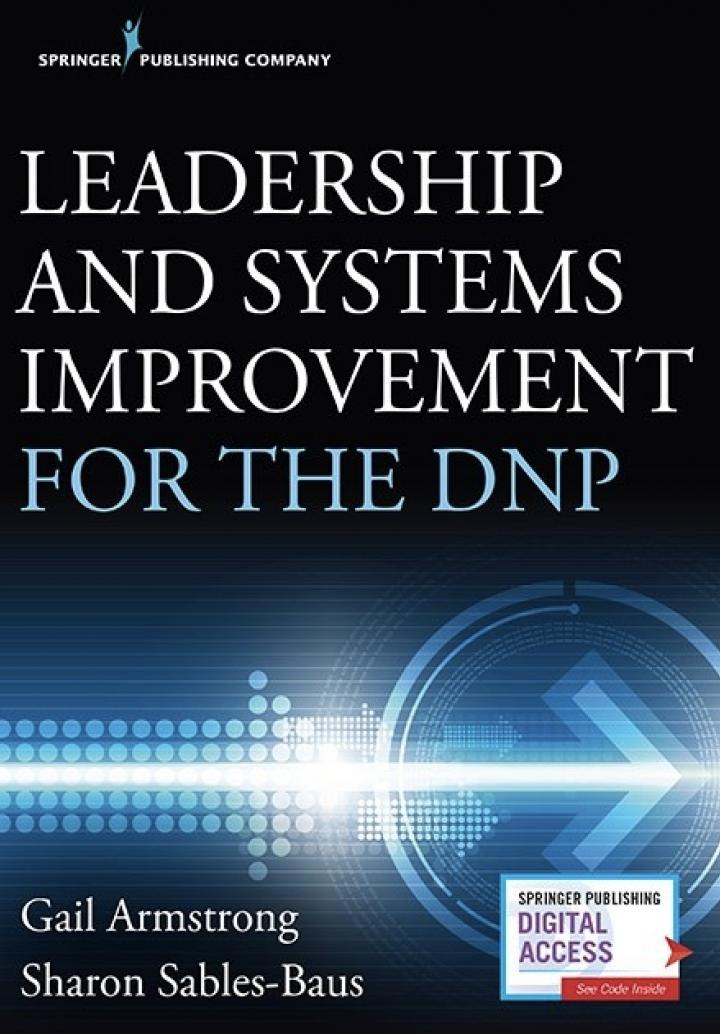
IMAGE: Leadership and Systems Improvement for the DNP. view more
Credit: University of Colorado College of Nursing
Creators of a first-of-its-kind textbook set for release on Aug. 1 aim to fill a void in doctor of nursing practice (DNP) programs that could help reduce deadly medical errors and enhance quality health care across the country.
As a rapidly changing health care environment demands more responsibility of all nurses, a need for equipping tomorrow’s nursing leaders with system-based education exists, according to the book’s creators, two faculty members in the University of Colorado’s College of Nursing.
“Today’s clinical nurse leaders are often charged with improving a system or translating evidence into practice to improve outcomes,” said Gail Armstrong, PhD, DNP. “It’s this bigger-picture thinking that this book addresses, and that’s a different skillset than DNPs currently have,” said Armstrong, who co-edited her book with Sharon Sables-Baus, PhD.
After a DNP became the accepted clinical doctorate degree in nursing in 2004, programs skyrocketed, with nearly 450 in existence or in the planning stages in the United States today, according to the American Academy of Colleges of Nursing.
“Leadership and Systems Improvement for the DNP,” published by Springer Publishing Co., focuses on systems leadership and using those skills in producing a meaningful final DNP Project and in leading projects throughout a career.
This two-fold mission provides another unique aspect of the book, Sables-Baus said. “We really envision it to be used not only across the curriculum while DNP students are in school, but also as a resource for graduates out working in the field,” she said.
Sables-Baus’s 13 years performing quality improvement projects and program evaluations and her Certification as a Professional in Patient Safety (CPPS) informed the content of the book. She has commonly seen DNPs assigned as leaders of program evaluations or other projects who struggle at first, she said. “This book will be a wonderful reference. It walks readers through the process.”
Topics range from quality metrics to cost analysis, and many chapter authors are CU Nursing faculty.
Armstrong’s 12 years of working in the quality and safety arena inspired the book, including seven years on the faculty of the Institute for Healthcare Quality, Safety and Efficiency (IHQSE), which provides a one-year training program for clinicians. “A lot of the book’s contents comes right out of that work,” she said.
DNP training focuses on translation of evidence and clinical leadership in nursing, unlike a research-focused PhD program. “It’s the highest degree you can get if you want to stay by the bedside,” said Armstrong, who was in the second-ever Nursing Doctorate Program at CU Nursing before it transitioned into the DNP program in 2005.
Armstrong calls filling the education gap critical. “Our health care systems are changing very rapidly right now,” she said, using a move from a fee-for-service toward a value-based payment model as an example. “That’s a dramatic shift. We need clinical nurse leaders who know how to lead and improve microsystems to accomplish that shift and many more.”
###
The book is available for preorder online.
About the University of Colorado Anschutz Medical Campus
The University of Colorado Anschutz Medical Campus is a world-class medical destination at the forefront of transformative science, medicine, education, and healthcare. The campus encompasses the University of Colorado health professional schools, more than 60 centers and institutes, and two nationally ranked hospitals that treat more than 2 million adult and pediatric patients each year. Innovative, interconnected and highly collaborative, together we deliver life-changing treatments, patient care, professional training, and conduct world-renowned research powered by more than $500 million in research awards. For more information, visit https:/
Disclaimer: AAAS and EurekAlert! are not responsible for the accuracy of news releases posted to EurekAlert! by contributing institutions or for the use of any information through the EurekAlert system.

